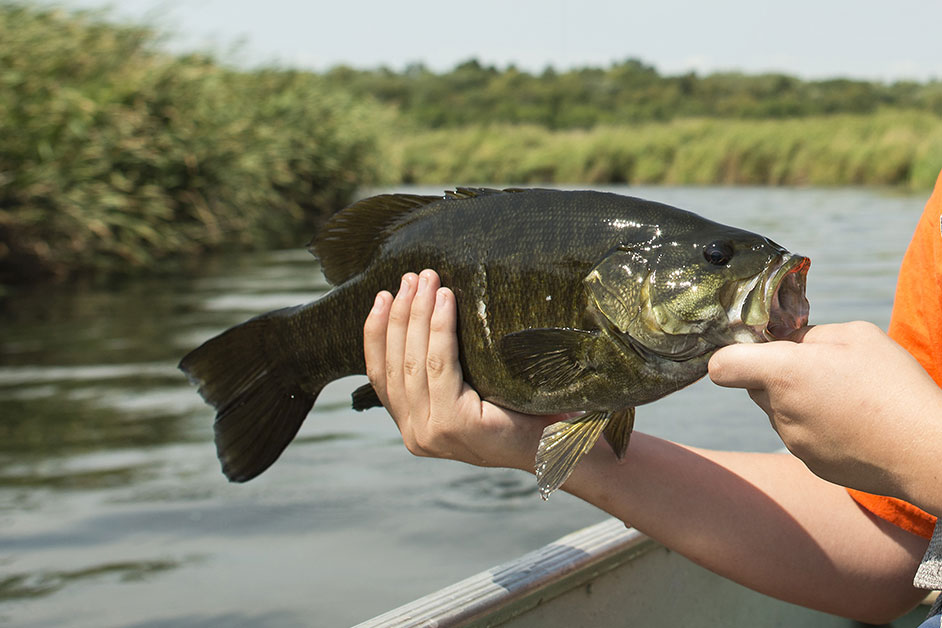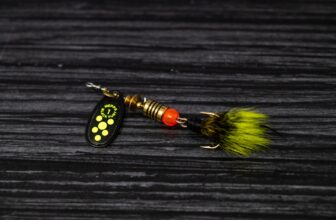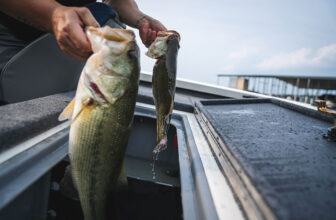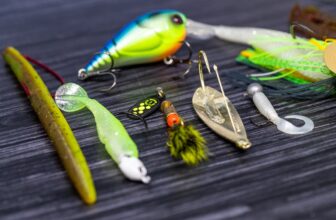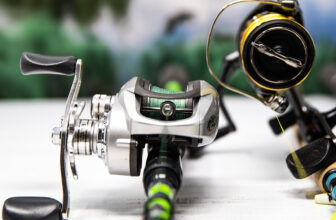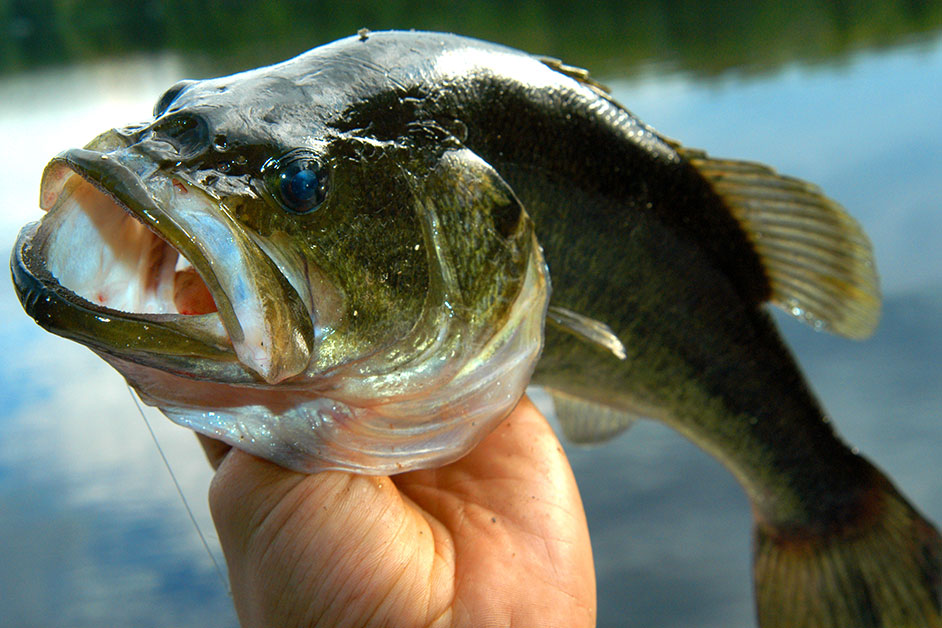
Distinguishing between a smallmouth vs largemouth bass and which one to fish for is a common question among beginner anglers. Growing up I looked forward to two distinctly different fishing experiences every summer. My grandparents lived in the Ozark Mountains of Southern Missouri. Grandpa was a hog farmer and grandma tended to a garden that seemed the size of a football field. Every summer my parents would dump me off and let me have some country boy fun.
Some days we would fish the farm ponds scattered across Grandpa’s land for bass. They were littered with lily pads and moss that made perfect cover for largemouth monsters. I still have a picture of my grandfather and I holding a big bass with me at three years old. We would bust out the topwaters and plastic worms and go after them.
Other days we would take my uncle’s flat bottom boat out on the Eleven Point River. This clear, spring-fed river has rainbow trout in the cold water and lots of smallmouth bass in the warmer waters downriver. He would magically make the tiniest adjustments to the motor to keep the boat still so we could go after those perfect spots in the current. We would often catch our limit before lunch and have a fish fry on the shore with potatoes and onions.
These two species of fish have many similarities. Their markings and color are similar. Their size is sometimes similar. The waters you will find them in are similar. However, there are lots of differences between these two fish. In this article, we will cover smallmouth bass vs largemouth bass and how to catch each one.
Which Fish is It? Smallmouth VS Largemouth Bass
If you are fishing in waters that have both smallmouth bass and largemouth bass, you will want to know the difference between the two. These two species often have different regulations for what size is a keeper and how many you can keep, so be sure to get it right.
By far the most noticeable difference between smallmouth bass and largemouth bass is the size. As a child, most of the smallmouth bass were a pound or two. There are monsters out there as large as 10 lbs, but I rarely saw them. However, it was not uncommon to catch largemouth bass that were five or six pounds. Largemouth bass are about twice as big on average and grow to over 20 lbs. To determine the species, this is a good place to start. It also tells you which fish to target if you are focused on size.
Of course, largemouth bass have bigger mouths than smallmouth bass. If you want to get specific, the upper jaw of a smallmouth bass is in line with the eye. Largemouth bass have an upper jaw that goes past the eye. The fin placement is a bit different as well. Smallmouth bass have no break between the dorsal fins. The largemouth will have a break.
You will notice that the striping on these two bass species is different. The stripes on a largemouth bass are horizontal, while the stripes on a smallmouth are vertical. The coloring is also slightly different if you look closely. Smallmouth bass are sometimes called brown bass and largemouth are called green bass. Don’t let this fool you. Both species vary quite a bit in color, so you cannot count on color to distinguish between the two.
Finally, the behaviors of the two fish are noticeably different. Once you get a strike and set the hook, you will quickly find out who you have on the line. Both species of bass love to jump out of the water once hooked. They launch themselves and writhe back and forth trying to shake free. The difference is that largemouth bass normally jump once and then you can reel them in. Smallmouth bass will keep jumping as long as they have the energy to do so.
Where to Find Them
There are a few big differences in behavior that will help you determine where to find largemouth bass vs where to find smallmouth bass. The first is cover. Largemouth bass love to hide in cover so they can hunt their prey. All fish are predators, but largemouth bass seem to take this to the extreme. They love to sit around rocks, logs, weeds, grasses, brush, and lily pads to camouflage their location. Then they aggressively strike on instinct.
They also like cover because it generally provides spots in rivers where the current is not as strong. Largemouths do not like strong currents. They like to do as little as possible until it is time to strike. Because of this, spots in rivers where a fast current meets a hole or still spot with cover are perfect to find largemouth bass. Smallmouth bass love hard currents and will hunt directly in the current. There is no need to look for breaks when fishing smallmouth bass.
Smallmouth bass also stay around cover like most fish species. However, they do not like to sit in the cover like largemouth bass. They like to swim around the edges of the cover area to target prey. One favorite type of cover for smallmouths is rocky structures in deep water such as bridge pillars, dams, and holes behind boulders.
You can find both smallmouth and largemouth bass in the same rivers and lakes, but not in the same spots. Another difference for these fish is that largemouth bass tend to stick to warmer water whereas smallmouth bass enjoy colder waters. Also, largemouth bass are used to murky, muddy waters and do not rely on eyesight as much. Smallmouth bass have keen eyesight and are known to chase baitfish from a distance when spotted. Finally, smallmouth bass like deep, open waters. This is where they find the cooler water temperatures they prefer.
Ideal Seasons and Weather
If you want to get specific and target either smallmouth or largemouth bass, you need to know when to fish. For bass, this often depends on where you plan to fish. Every river, lake, and pond is going to have differences in vegetation and depth that will affect the peak season for fishing. Largemouth bass like warmer water and stick to shallow water in the summer. Summer also happens to be when the vegetation is thickest, so it can be a great time of year for cover.
For ideal weather conditions, largemouth bass are similar to most fish. Typically, fish will spook less on cloudy days on which visibility is limited. Wind is always a bad thing for fishing, so avoid especially windy days. Just before a storm is a good time to target largemouth bass. The barometric pressure will drop which causes the stomach of the fish to expand. This makes them feel hungry even when they aren’t.
Smallmouth bass have distinctly different behaviors. They will stay in shallow waters to spawn in the springtime. However, they cannot handle the warmer water in the summer. During these few months they head to the depths to cool off. This makes spring and fall ideal seasons for smallmouth bass.
Unlike largemouth bass, smallmouth bass are more comfortable when they can see their prey. They prefer bright sunny days, so you should as well. With smallmouth bass you want to spot fish in the water to know where to cast, so increased visibility helps you too. Any significant wind would disrupt the surface of the water and reduce visibility.
Techniques for Smallmouth VS Largemouth Bass
There are dozens of secret tips and tricks I have heard over the years for catching both largemouth and smallmouth bass. Some of them have held true and some seem to make no difference. In addition, an entire market has been created for new and innovative bass lures. If you surveyed a dozen anglers on their favorite bass lure, you might get a dozen different answers.
If I am going after largemouth bass, I am constantly hitting the grasses and lily pads where they hide. I love dropping it right on the edge of a mass of lily pads and waiting for a strike. I also sometimes bounce my lure across the tops of the lily pads with a Texas rig and drop my lure into holes in the middle. You are more likely to get snagged, but this debris is where largemouth bass are hiding. I like dark colored plastic worms, but jigs can work as well. Remember, largemouth bass are lazy and will rarely chase your lure. Drop it on their nose so they cannot ignore it.
Smallmouth bass are not picky on lures. They go after vibrating jigs, crankbaits, spinnerbaits, and even topwaters. They are visual hunters and will go after movement and shiny objects that they see from a distance. Because they have sharp eyesight, thicker fishing lines will not work. When the sky is clear and the sun is shining, they will spot a thick line a mile away. Either plan on using a lighter line, or plan on taking a break when the sun is highest.
Which One is Better?
Honestly, I have fond memories from throughout my life of fishing both largemouth and smallmouth bass. However, they are two completely different experiences. I love that largemouth bass strike hard and fight hard. I also love that my average largemouth caught is probably around five pounds. Those are far from record setting figures, but that size is ideal for eating. Fishing for largemouth bass is a more relaxing type of fishing in that you fish the cover, not the fish. You just keep hitting those cover spots knowing the fish will be there eventually.
Smallmouth fishing is completely different. It involves working with strong currents and deeper water. You must think more about the visual presentation of your lure and line so you do not spook the fish. There tends to be a lot more time spent trying to figure out the right spots and keeping the boat near those spots. Smallmouths like to jump and fight, but they tend to be smaller. It is hard to choose, but if forced I would pick largemouth fishing because of the average size alone. We eat what we catch.
The truth is that I have a special place in my heart for both species. For me, smallmouth fishing was all about river days. It was about the breeze in my face running up and down the river at top speed and wondering how we never hit any rocks. It was about shore lunches and sometimes an afternoon nap under a shade tree. It was normally an all-day event.
Largemouth fishing was about getting up at the crack of dawn. It was about flipping my plastic worm into the perfect spot next to the lily pads. Often it was about sunburns and being forced to fish at night until I made a full recovery. Both types of fishing are loads of fun and can put fish in the freezer. It really comes down to personal preference. In the end, you will have a blast with either option.

